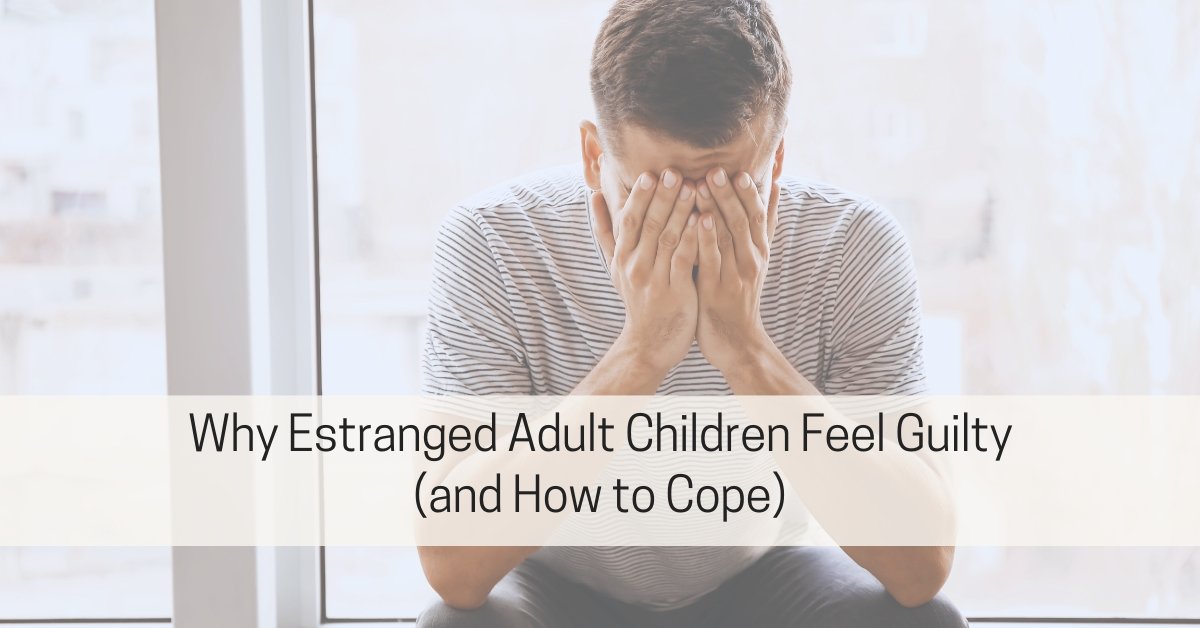For many estranged adult children, guilt is one of the most persistent and complex emotions to cope with. Even when the choice to create distance from parents is necessary for emotional health, a heavy weight of “shoulds” can linger. You might think, “I should be more forgiving,” or “I shouldn’t have cut ties.” These thoughts don’t appear out of nowhere—they’re rooted in powerful cultural messages about family, as well as the deep bonds and long histories you have with your parents.
Understanding why guilt shows up and how to cope with it can help you heal from estrangement.
Why Guilt Feels So Strong for Estranged Adult Children
Estrangement-related guilt is strong due to the powerful social and cultural messages we internalize from a young age. Many of us are taught that loyalty to parents is a moral obligation, that family always comes first, and that love should be unconditional. Phrases like “honor your father and mother” or “blood is thicker than water” are repeated so often that they become deeply ingrained beliefs about what is right or expected. When your actions break from these expectations—such as creating distance or going no contact—it naturally triggers feelings of guilt.
Estrangement often brings false guilt, the kind of guilt that arises even when you haven’t actually done anything wrong. You may know intellectually that the relationship was harmful and that stepping back was necessary, yet emotionally, you still feel remorse or doubt. False guilt is common in estrangement because of the attachment you have to your parents and the desire to meet their expectations. Feeling guilty doesn’t necessarily mean you’ve made a mistake—it often signals the emotional weight of connection and the internal conflict between your needs and family pressures.
Guilt can also reflect your capacity for care and empathy. The fact that you feel guilt, even false guilt, shows how deeply you value relationships and how much you long for harmony. Understanding this distinction is key: guilt does not necessarily indicate wrongdoing. Instead, it often reflects the importance of connection in your life and the challenge of balancing self-protection with emotional ties.
Common Triggers for Guilt After Estrangement
Certain moments tend to bring guilt to the surface more sharply:
- Holidays and milestones. Family-centered times of year, birthdays, or major celebrations highlight the absence of your parents or family, stirring self-doubt and nostalgia for what you wished the relationship could have been.
- Comments and criticism from others. Friends, relatives, or even acquaintances may suggest that you should reconcile or “forgive and forget,” which can intensify feelings of guilt and second-guessing.
- Seeing other families. Observing others, in real life or online, share warm connections with parents can trigger sadness, comparison, and questioning whether your decision was correct.
- Loneliness. Even when estrangement was necessary, missing the comfort or familiarity of parental presence can create conflicting emotions, making it harder to trust your own choices.
Naming these triggers helps you prepare and respond with compassion instead of judgment.
How Estranged Adult Children Can Cope with Guilt
If guilt is weighing heavily on you, there are practical steps you can take to reduce it:
- Validate your decision to cut ties. Remind yourself why you made the decision to step back. Write down the harmful patterns or situations you experienced so you can return to that list when doubt creeps in. For additional support, my book Cutting Ties with Your Parents guides adult children in making peace with their decision, stopping second-guessing, and understanding their reasons for cutting ties so that they can move forward with clarity.
- Recognize guilt and shame as manipulation tactics. Parents who are controlling or abusive often use guilt and shame to influence your choices. Parents or others may still use guilt-trips and social pressure to push you back into a relationship with your family. Recognizing these tactics for what they are helps you separate your own choices from external pressure and reinforces that cutting ties can be a healthy, valid decision.
- Practice self-compassion. Speak to yourself as you would to a dear friend, instead of criticizing yourself for distancing yourself from family or other perceived inadequacies.
- Set boundaries with outside opinions. You don’t need to justify your choices to everyone. A simple, “I’m focusing on what’s best for me right now,” can protect your peace. In addition, you may need to limit contact with people who persist in criticizing, pressuring, or shaming you.
- Seek support. Surround yourself with people who validate your experience, whether that’s trusted friends, a therapist, or communities of other estranged adult children. Even podcasts and self-help books can give support through validation and stories from others who’ve had similar experiences.
Looking Forward
Guilt doesn’t vanish overnight, but it becomes lighter when you stop treating it as evidence that you’ve made the wrong choice. Instead, see guilt as part of the emotional terrain of estrangement—a natural response that you can acknowledge and then move through.
Healing takes patience. You may find that guilt surfaces less often as you create new traditions, surround yourself with chosen family, and develop deeper trust in yourself. Every step you take toward peace is worth celebrating.
You’ve already shown courage by choosing what you need for your well-being. Trust that your healing matters, and give yourself permission to move forward with compassion.
©2025 Dr. Sharon Martin, LCSW. All rights reserved. Photos courtesy of Canva.com.
“A masterful and practical gem of a workbook for those cutting ties with their parents …. Bravo!”
– Dr. Sherrie Campbell, author of Adult Survivors of Emotionally Abusive Parents
Read More
Publisher: Source link






